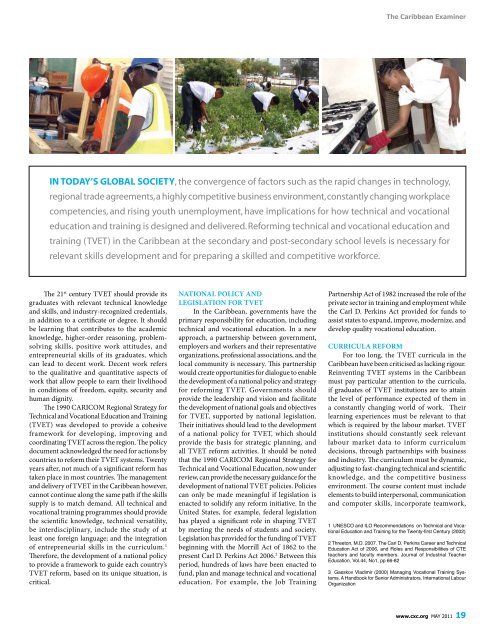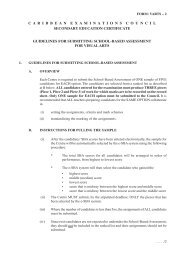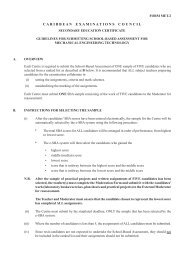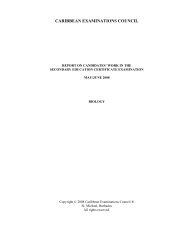The Caribbean Examiner ⢠Vol 9 ⢠No 1 ⢠May 2011
The Caribbean Examiner ⢠Vol 9 ⢠No 1 ⢠May 2011
The Caribbean Examiner ⢠Vol 9 ⢠No 1 ⢠May 2011
You also want an ePaper? Increase the reach of your titles
YUMPU automatically turns print PDFs into web optimized ePapers that Google loves.
<strong>The</strong> <strong>Caribbean</strong> <strong>Examiner</strong><br />
IN TODAY’S GLOBAL SOCIETY, the convergence of factors such as the rapid changes in technology,<br />
regional trade agreements, a highly competitive business environment, constantly changing workplace<br />
competencies, and rising youth unemployment, have implications for how technical and vocational<br />
education and training is designed and delivered. Reforming technical and vocational education and<br />
training (TVET) in the <strong>Caribbean</strong> at the secondary and post-secondary school levels is necessary for<br />
relevant skills development and for preparing a skilled and competitive workforce.<br />
<strong>The</strong> 21 st century TVET should provide its<br />
graduates with relevant technical knowledge<br />
and skills, and industry-recognized credentials,<br />
in addition to a certificate or degree. It should<br />
be learning that contributes to the academic<br />
knowledge, higher-order reasoning, problemsolving<br />
skills, positive work attitudes, and<br />
entrepreneurial skills of its graduates, which<br />
can lead to decent work. Decent work refers<br />
to the qualitative and quantitative aspects of<br />
work that allow people to earn their livelihood<br />
in conditions of freedom, equity, security and<br />
human dignity.<br />
<strong>The</strong> 1990 CARICOM Regional Strategy for<br />
Technical and Vocational Education and Training<br />
(TVET) was developed to provide a cohesive<br />
framework for developing, improving and<br />
coordinating TVET across the region. <strong>The</strong> policy<br />
document acknowledged the need for actions by<br />
countries to reform their TVET systems. Twenty<br />
years after, not much of a significant reform has<br />
taken place in most countries. <strong>The</strong> management<br />
and delivery of TVET in the <strong>Caribbean</strong> however,<br />
cannot continue along the same path if the skills<br />
supply is to match demand. All technical and<br />
vocational training programmes should provide<br />
the scientific knowledge, technical versatility,<br />
be interdisciplinary, include the study of at<br />
least one foreign language; and the integration<br />
of entrepreneurial skills in the curriculum. 1<br />
<strong>The</strong>refore, the development of a national policy<br />
to provide a framework to guide each country’s<br />
TVET reform, based on its unique situation, is<br />
critical.<br />
National policy and<br />
legislation for TVET<br />
In the <strong>Caribbean</strong>, governments have the<br />
primary responsibility for education, including<br />
technical and vocational education. In a new<br />
approach, a partnership between government,<br />
employers and workers and their representative<br />
organizations, professional associations, and the<br />
local community is necessary. This partnership<br />
would create opportunities for dialogue to enable<br />
the development of a national policy and strategy<br />
for reforming TVET. Governments should<br />
provide the leadership and vision and facilitate<br />
the development of national goals and objectives<br />
for TVET, supported by national legislation.<br />
<strong>The</strong>ir initiatives should lead to the development<br />
of a national policy for TVET, which should<br />
provide the basis for strategic planning, and<br />
all TVET reform activities. It should be noted<br />
that the 1990 CARICOM Regional Strategy for<br />
Technical and Vocational Education, now under<br />
review, can provide the necessary guidance for the<br />
development of national TVET policies. Policies<br />
can only be made meaningful if legislation is<br />
enacted to solidify any reform initiative. In the<br />
United States, for example, federal legislation<br />
has played a significant role in shaping TVET<br />
by meeting the needs of students and society.<br />
Legislation has provided for the funding of TVET<br />
beginning with the Morrill Act of 1862 to the<br />
present Carl D. Perkins Act 2006. 2 Between this<br />
period, hundreds of laws have been enacted to<br />
fund, plan and manage technical and vocational<br />
education. For example, the Job Training<br />
Partnership Act of 1982 increased the role of the<br />
private sector in training and employment while<br />
the Carl D. Perkins Act provided for funds to<br />
assist states to expand, improve, modernize, and<br />
develop quality vocational education.<br />
Curricula Reform<br />
For too long, the TVET curricula in the<br />
<strong>Caribbean</strong> have been criticised as lacking rigour.<br />
Reinventing TVET systems in the <strong>Caribbean</strong><br />
must pay particular attention to the curricula,<br />
if graduates of TVET institutions are to attain<br />
the level of performance expected of them in<br />
a constantly changing world of work. <strong>The</strong>ir<br />
learning experiences must be relevant to that<br />
which is required by the labour market. TVET<br />
institutions should constantly seek relevant<br />
labour market data to inform curriculum<br />
decisions, through partnerships with business<br />
and industry. <strong>The</strong> curriculum must be dynamic,<br />
adjusting to fast-changing technical and scientific<br />
knowledge, and the competitive business<br />
environment. <strong>The</strong> course content must include<br />
elements to build interpersonal, communication<br />
and computer skills, incorporate teamwork,<br />
1 UNESCO and ILO Recommendations on Technical and Vocational<br />
Education and Training for the Twenty-first Century (2002)<br />
2 Threeton, M.D. 2007. <strong>The</strong> Carl D. Perkins Career and Technical<br />
Education Act of 2006, and Roles and Responsibilities of CTE<br />
teachers and faculty members. Journal of Industrial Teacher<br />
Education, <strong>Vol</strong>.44, <strong>No</strong>1, pp 66-82<br />
3 Gasskov Vladimir (2000) Managing Vocational Training Systems.<br />
A Handbook for Senior Administrators. International Labour<br />
Organization<br />
www.cxc.org MAY <strong>2011</strong> 19

















